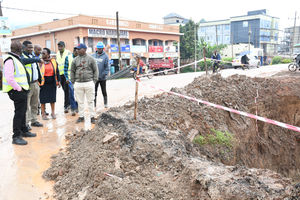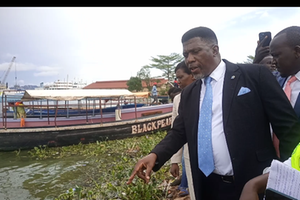
A man sorts garbage at Mpanga Market in Fort Portal City. PHOTO/ALEX ASHABA
On April 9, 2023, President Museveni issued an Executive Order instructing all urban authorities to place a garbage skip every 200 metres in their towns. This Executive Order was expected to be enforced within six months.
“That skip must be emptied every three days, or more frequently, if the volumes are big,” the Executive Order reads in part.
The President said he was tired of seeing stockpiles of garbage whenever he drove around Kampala and parts of upcountry towns. Mr Museveni said he wants plastic recycled into new-use forms, organic wastes into manure, and waste paper into toilet paper.
Within a year, the President said every urban centre must have come up with a clear plan for recycling solid waste. However, a year later little or nothing has been done on the ground.
Mr Richard Ssekyondo , the chairperson of Division B in Entebbe Municipality, said they have not implemented the Order because locally generated revenue is no longer managed by Entebbe Municipal Council.
He also explained the division hired a private firm to handle garbage to save costs on buying garbage skips, fuelling and repairing garbage trucks.
“ So, Entebbe chose to privatise garbage and we now have a company that collects garbage from residents and the market and the latter pay some fees,” he added.
Currently, Mr Ssekyondo said they are embarking on sensitising residents through a programme dubbed “ Weeyonje” [clean yourself].
“Providing garbage skips is an outdated method of managing waste and I don’t think we can go back to that era,” he added.
In Arua , authorities said waste management is costly. During a benchmarking visit to Mbarara City, they said they learnt a better way of managing waste ,similar to that in Entebbe.
Mr David Kyasanku, the Arua City clerk, said private firms, like in Entebbe, have been contracted to manage garbage in towns and residential areas. The firms transport the garbage to a composite recycling plant at Euata, which is outside Arua City .
“Our recycling plant was established in 2011 with funding from the World Bank through the National Environment Management Authority (Nema) to recycle garbage into manure. Currently, we generate about Shs11 million from manure sales,” he said.
Last year, the city designated at least 22 garbage collection sites. Currently, Arua City needs more than Shs 100 million to effectively manage garbage dumping site in Euata.
Mr Robinson Draga, the production officer of Ayivu Division, said there is a need to intensify enforcement.
“As a result of low manpower and equipment, management of garbage is becoming difficult, especially in markets... This is because the trucks take a long time to reach the points where garbage has been piled waiting for collection,” he said.
Kabale Municipal Council Mayor ,Mr Sentaro Byamugisha, said the Executive Order on garbage skips will only be implemented once the central government allocates more money to the council.
“Placing a garbage skip 200 metres away from each other is expensive…In Kabale Municipality, we require about 100 garbage skips that [will] cost Shs200m. We shall not implement that Executive Order until central government allocates funds to purchase the garbage skips,” Mr Byamugisha said.
About 50 tonnes of garbage are collected every day in Kabale Town and conveyed to Kirengyere Garbage Recycling Centre on Kabaraga hills, according to Mr Byamugisha.
In Gulu, Mr Innocent Ahimbisibwe, the city clerk, admits that poor garbage disposal is still a hard nut to crack.
Early this year, Mr Ahimbisibwe said they drafted an ordinance on solid waste management, which, among others, seeks to impose a penalty of Shs40,000 on those convicted of littering waste in public.
“We wish to take Gulu City to higher levels in terms of cleanliness; if somebody is eating ripe bananas or maize, how can we have this waste put in a trash can?” he said.
The ordinance, whose debate and enactment are pending in the city council’s sitting, covers violations such as dumping and littering of waste in public places, vehicles, motorcycles, and bicycles parking in undesignated places and setting up washing bays in the wetlands illegally, among others.
Ms Joyce Aryemo Latigo, the acting Gulu City environment officer, said the ordinance once passed and enforced, will minimise plastic waste in the wetlands and the environment.
In Jinja, city authorities said they are seeking partnerships to implement the Executive Order.
According to Mr Juma Ssozi, the Jinja City secretary for works, they have teamed up with Makerere University Business School (Mubs) to distribute garbage skips.
In Njeru Municipality, which is so close to Jinja City, the municipal speaker, Mr Robert Mulwana, said they have not received any money to enforce the Presidential directive.
He said the litter bins positioned at bodaboda and taxi stages were provided by companies and factories within the municipality.
“To effectively enforce the Presidential directive, the government should abolish the system of remitting local revenue collections to the central and allow each township to manage its revenue for effective service delivery,” Mr Mulwana said.
Mr Sam Paul Ogwang Alunyu, the chairperson of Kamudini Town Council, Oyam District, said leaders have resolved to start punishing people who are caught littering the town.
“Once you dispose any waste material in an area, which is not gazetted for waste disposal, we shall fine you two currency points; that is Shs40,000,” he said.
The town council’s projected revenue generation for this current financial year is Shs28 million. However, of this, 40 percent (Shs11.2 million) would be spent on garbage collection alone, according to the acting town clerk, Ms Grace Ayugi.
Ms Ayugi said more than 3,000 tonnes of garbage is generated in Kamdini Town Council daily.
The Masaka City Health Officer, Mr Musa Maberi, said they lack funds to implement the directive since it require authorities to buy about 920 skips, each costing Shs17m-which translates to Shs15.6 billion.
He, however, said private firms are handling garbage.
“ The two private firms -TUMACAS, and YAMAC have helped in reducing heaps of garbage in the city. City dwellers have also adopted better ways of managing their garbage and wait for the trucks of the private partners to pick it and take it to the place where it is dumped, this has partly solved the challenges the Executive Order tried to address “ he adds .
Mr Gilbert Boona, the Bushenyi Ishaka Municipality deputy town clerk, said they are aware of the Executive Order, but their focus is more on ensuring garbage is managed well.
“The old ways of bringing garbage skips back in municipalities and cities bring back the flies and stench. The new system we are using seems to work, the generator pays for his or her garbage and we don’t spend any money on garbage collection,” he said.
Mr Fenard Katunda Mukuru, the Ibanda Municipal Town Clerk, said: “If we are to have garbage skips on all the 10 streets here, we might require more than Shs3.4million for one street and over Shs30 million to buy all of them, plus the vehicles to carry garbage to the gazetted dumping area.”
Meanwhile, Mr Paul Omer, Mayor Soroti City East, decried the lack of funds for the maintenance of equipment for garbage collection.
But Mr Jim Mugunga, the spokesperson Ministry of Finance, said it is upon urban authorities to allocate money in their budgets for waste management.
“Urban authorities and local governments budget for all their activities including waste management. As Ministry of Finance, we expect them to make maximum use of alternative financing of activities such as waste management,” he said.
NO Skips in Mbarara
Mr Didas Muhanguzi, the Mbarara City South clerk, said garbage skips were banned in the city.
“We no longer have those garbage skips in our city; dwellers were not using them properly. Currently, we have a service provider who collects garbage in the city,” he said.
Mr Bonny Tashobya, the Mbarara City Council speaker, said all dwellers pay a fee for garbage collection.
“They [dwellers] have dustbins where they keep garbage before it is collected and this has worked for us. We used to spend Shs500m every month, which used to drain our budget,” he said.
Compiled by Al-Mahdi Ssenkabirwa, Felix Warom Okello ,Eve Muganga ,Clement Aluma, Abubaker Kirunda,Robert Muhereza, Denis Edema ,Emmanuel Arineitwe , Felix Ainebyoona, Milton Bandiho, Coslin Nakayiira, Jovita Kyarisiima, Julius Byamukama , Bill Oketch ,Antonio Kalyango, Tobbias Jolly Owiny ,Malik F Jjingo &Simon Peter Emwamu



